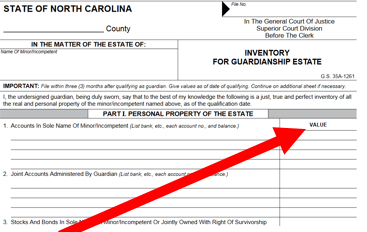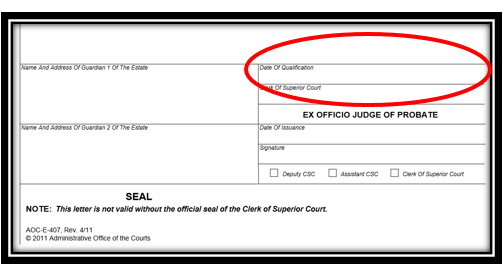In connection with an upcoming class on guardianship, I recently surveyed a number of clerks of superior court (judicial officials who preside over guardianship cases in NC) about common post-appointment problems among guardians. My questions focused on non-attorney individuals serving as general guardians and guardians of the estate. Here are some specific issues identified related to those guardians charged with managing an incompetent adult’s property under G.S. Chapter 35A of the NC General Statutes. For purposes of this post, “guardian” means a guardian of the estate or general guardian.
1. Lack of Understanding of the Role and Responsibility of a Guardian
The most common response I received was that individuals, such as family members, friends, and caregivers, who seek guardianship for an incompetent adult often do not understand the scope of duties imposed on a guardian. Guardianship creates a legal relationship between the individual appointed as guardian and the incompetent adult. The court through the court’s order appointing the guardian replaces the adult’s authority to make decisions with the guardian’s authority related to the adult’s property. G.S. 35A-1201(a)(3). The appointment imposes fiduciary duties on the individual serving as guardian such as the duty to act honestly and in the adult’s best interests. It also imposes the obligation:
- To post and maintain an adequate bond. G.S. 35A-1230.
- To timely and satisfactorily file an inventory and supplemental inventories evidencing the property owned by the incompetent adult. G.S. 35A-1261, -1263.1.
- To timely and satisfactorily file annual accountings evidencing the guardian’s collection, preservation, management, and use of the incompetent adult’s property. G.S. 35A-1264.
These filings may overwhelm an individual who has no history of managing and accounting for property on behalf of another person. This commonly occurs among spouses when one spouse is appointed as guardian for an incompetent spouse and the incompetent spouse always handled the couple’s finances prior to incompetency. The NC Administrative Office of the Courts maintains two tools that may help a person better understand what it means to become a guardian – a pamphlet, Responsibilities of Guardians in North Carolina, and a video, Understanding Guardianship. It is advisable for individuals who want to be appointed as a guardian to review both before making an application for appointment with the clerk.
2. Failing to Obtain and Maintain a Sufficient Bond
Another common issue noted is guardians regularly fail (i) to post the bond before receiving the incompetent adult’s property and (ii) to increase the amount of the bond to account for additional personal property received by the guardian. A bond is a critical tool to protect and compensate the incompetent adult from financial loss as a result of the guardian’s failure to properly exercise the guardian’s duties or malfeasance. It is typically written by a corporate surety such as an insurance company and functions to reimburse the incompetent adult in the event of a breach of duty by the guardian that results in a loss. There are two critical times related to the bond in a guardianship estate.
The first critical time is at the initial qualification of the guardian. The court appoints a guardian at or subsequent to the hearing before the clerk through the order on the application for appointment of a guardian. The guardian must then qualify to serve as guardian. To qualify, the guardian must file an application, take an oath, and post a bond. The guardian must post a bond acknowledged before and approved by the clerk before receiving the incompetent adult’s property and before the court will issue letters of appointment (letters authorizing the guardian to act on behalf of the incompetent adult). In practice, this means that the person seeking to be appointed as the incompetent adult’s guardian will have to pay for the bond premium out of pocket and then receive a reimbursement from the adult’s estate after qualification as guardian.
The second critical time is when the guardian receives additional personal property after the original bond is posted. The guardian must increase the amount of the bond before additional personal property comes into the hands of the guardian. G.S. 35A-1231(b). For example, if the court orders a sale of the incompetent adult’s real property, the guardian must furnish bond or increase the existing bond to cover the proceeds of sale of the real estate before the proceeds of the sale are paid to the guardian to manage on behalf of the incompetent adult.
The clerk generally does not have the authority to waive the bond for a guardian who receives the incompetent adult’s personal property.* The clerk has discretion to set and adjust the amount of the bond. G.S. 35A-1203(c). In practice, the clerk will review the bond to determine if it is in the proper amount at the time of the preliminary inventory, the inventory, any supplemental inventory, and each annual accounting. The guardian has a continuing obligation to post an adequate bond and to increase the existing bond to cover personal property received by the guardian and projected annual income and receipts throughout the guardianship even if that occurs between those filings with the clerk. G.S. 35A-1231(b).
3. Listing Correct Property Value on the Inventory
The guardian must file an inventory of the incompetent adult’s real and personal property within three months of the qualification date of the guardian unless extended up to six months for good cause by the clerk. G.S. 35A-1261. An inventory form is available for guardians to use (E-510). A frequent mistake by guardians is listing the value of the property as of the date of the inventory rather than the date of qualification.

The value of real and personal property listed on the inventory, as noted on the form, must be as of the date of qualification of the guardian. The qualification date is shown on the letters of appointment of the guardian (E-407, guardian of the estate and E-413, general guardian).

4. Not Providing Proper Documentation for Accountings
The guardian must file an accounting with the clerk within one year plus 30 days from the date of qualification or appointment and annually thereafter until the guardianship is terminated. G.S. 35A-1264. An accounting form is available for the guardian to use (E-506). The accounting must be filed together with:
- vouchers such as cancelled checks and receipts for all payments made by the guardian of the ward’s property or verified proof in lieu of vouchers, and
- investment and bank statements showing cash balances. G.S. 35A-1264.
Frequently, guardians do not keep detailed and accurate records of deposits and expenditures and fail to provide supporting documentation with the accounting to the court. The guardian must have records to substantiate each transaction involving the incompetent adult’s property including the date of the transaction, the reason for the expenditure or deposit, and other relevant information. The most acceptable form of documentation is cancelled checks. For an accounting to go smoothly with the clerk, a guardian presents the accounting and copies of bank statements and cancelled checks to the clerk evidencing each transaction on behalf of the incompetent adult.
5. Making Withdrawals for Cash from Guardianship Accounts
One of the cardinal sins of serving as a guardian is taking cash out of a guardianship account without court authority. The guardian may be authorized by court order to withdraw a certain amount of cash on a monthly basis based on a court-approved budget. It is also possible that the court authorized the incompetent adult to receive and spend a certain amount of cash each month through the creation of a limited guardianship. Absent a court order, the guardian should not make withdrawals for cash from a guardianship account (including debit cards and checks for cash); if the guardian does use cash, the guardian should make sure to keep the receipt evidencing the expenditure. Instead of using cash, the guardian should write a check for each expenditure and make a note on the memo line indicating the purpose of the expenditure.
6. Not Obtaining Requisite Court Approval before Taking Certain Actions
Certain actions by the guardian require prior court approval and frequently guardians do not obtain such approval before taking the actions. Actions requiring prior court approval include:
- Any action requiring court approval by court order
- Expenditures of estate principal
- Sale, mortgage, or exchange of real property
- Lease of real estate for more than three years
- Sale, lease, or exchange of any personal property in the aggregate value of more than $5,000 per accounting period (typically, one year)
- Making of gifts of the incompetent adult’s property
- Payment of commissions and reimbursement of expenditures to the guardian
7. Co-Mingling the Incompetent Adult’s Money with Other Money
A repeated issue noted by clerks is the failure of guardians to maintain separate guardianship accounts. The guardian must keep the incompetent adult’s property separate and in a manner accessible only by the guardian. The guardian must identify and transfer money in the incompetent adult’s bank accounts to a separate guardianship account. This includes redirecting automatic deposits and drafts to and from the guardianship account. Guardians frequently run afoul of this requirement with regard to joint bank accounts. For example, an incompetent adult may have joint accounts with a family member upon appointment of the guardian. Both the incompetent adult and the family member have access to the money in the account. To adequately protect the incompetent adult’s property, the guardian withdraws the funds owned by the incompetent adult from the joint account and places the funds in a separate guardianship account. This requirement often causes difficulty for spouses where one spouse is adjudicated incompetent and the couple maintained joint accounts to pay for expenses such as the mortgage, utilities, and food.
8. Using the Incompetent Adult’s Money for the Guardian or Others
Another regular problem related to guardians is the use of the incompetent adult’s money for the guardian or people other than the incompetent adult. Some expenditures for others are permissible, such as the expenditure of estate income for support, maintenance, and education of the ward’s minor children, spouse, and dependents. G.S. 35A-1251(21). Although a court order is not required for these types of expenditures, it is advisable for the guardian to obtain court approval before making such expenditures. However, other expenditures, such as a $100 expenditure at a restaurant or $500 on vacation travel when the incompetent adult is in a locked-dementia unit, raise red flags on an accounting and are not permissible uses of the incompetent adult’s property by the guardian.
These common mistakes by guardians may have very serious consequences. They can result in removal of the guardian, liability in a civil proceeding in the form of a money judgment against the guardian individually, or a criminal conviction of the guardian, imprisonment, and an obligation to pay restitution to the incompetent adult. This is why the very first mistake identified in this list is an important one to avoid. Good guardianship practices start with a guardian who understands the role and responsibility of a guardian charged with making financial decisions for an incompetent adult. The court, including the clerk of superior court, is unable to provide legal advice. If a guardian has legal questions, the guardian should seek the advice of an attorney.
* The exception to this rule is under G.S. 35A-1212.1 in the case of an unmarried adult child who has been adjudicated incompetent. If a parent recommends a guardian for the child in the parent’s will, the parent may also recommend that the guardian qualify and serve without giving bond. However, if the clerk finds the interests of the incompetent adult would be best served by requiring the guardian to give a bond, the clerk may require the guardian to post a bond.